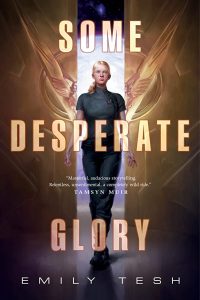Gary K. Wolfe reviews Robert Charles Wilson
 Throughout most of his career, Robert Charles Wilson has built a stellar reputation by combining skills that rarely were found together in earlier SF. On the one hand, he’s a master of the reveal – the sort of high-concept, seemingly inexplicable Houdini effects that had been a staple of the pulps at least since Murray Leinster’s ‘‘The Runaway Skyscraper’’ back in 1919. Wilson caused all of Europe to disappear overnight in Darwinia, peppered the world with enigmatic floating monoliths in The Chronoliths, and most famously cut the entire world off from the rest of the universe, both in space and time, in the Hugo-winning Spin and its sequels. On the other hand, he has developed these narratives around finely tuned and fluidly written observations of family tensions, complexly conflicted characters, and psychological insights that could compare favorably with the sensibilities of literary domestic realism. Wilson never quite lets the spectacle carry the narrative, although in a few cases (as with Darwinia) he’ll save the biggest reveal for the end of the novel. The post-apocalyptic scenario of his most recent novel, Julian Comstock, seemed to mark a return to more conventional narrative tropes, but here again he combines seemingly disparate elements: his repressive future America is part post-apocalypse, part steampunk alternate history, and part dime novel, with a pretty unreliable narrator thrown in to boot.
Throughout most of his career, Robert Charles Wilson has built a stellar reputation by combining skills that rarely were found together in earlier SF. On the one hand, he’s a master of the reveal – the sort of high-concept, seemingly inexplicable Houdini effects that had been a staple of the pulps at least since Murray Leinster’s ‘‘The Runaway Skyscraper’’ back in 1919. Wilson caused all of Europe to disappear overnight in Darwinia, peppered the world with enigmatic floating monoliths in The Chronoliths, and most famously cut the entire world off from the rest of the universe, both in space and time, in the Hugo-winning Spin and its sequels. On the other hand, he has developed these narratives around finely tuned and fluidly written observations of family tensions, complexly conflicted characters, and psychological insights that could compare favorably with the sensibilities of literary domestic realism. Wilson never quite lets the spectacle carry the narrative, although in a few cases (as with Darwinia) he’ll save the biggest reveal for the end of the novel. The post-apocalyptic scenario of his most recent novel, Julian Comstock, seemed to mark a return to more conventional narrative tropes, but here again he combines seemingly disparate elements: his repressive future America is part post-apocalypse, part steampunk alternate history, and part dime novel, with a pretty unreliable narrator thrown in to boot.
Now, with Burning Paradise, Wilson visits even more familiar territory – the notion of secret masters manipulating history for their own purposes, which was probably introduced into pop paranoia by Charles Fort and cemented into pulp-era SF by Eric Frank Russell’s Sinister Barrier, among others. In Wilson’s novel, we find ourselves in a 2015 in which a near-universal peace has prevailed since the end of WWI – no Depression, no WWII, no Holocaust, no Vietnam, etc. – but only because a parasitical alien collective intelligence called the hypercolony has been manipulating human history to set the stage for its own reproductive agenda, while suppressing certain technologies such as rocketry (even jet airliners are a new development in this 2015). Since the invention of radio, the hypercolony has been using the ‘‘radiosphere’’ to monitor, edit, and interfere with human communications, maintaining peace and relative prosperity despite the historical tendency of humans left unattended to screw things up. The central moral question of the novel is also a familiar one from dystopian and anti-utopian fiction: is such peace and prosperity a reasonable trade for the loss of free will and self-determination? (Some critics have argued that an anti-utopia differs from a dystopia in that in the former the inhabitants are generally happily adjusted to the situation despite the loss of freedom – of which they may be unaware – whereas in the latter nearly everyone feels oppressed and miserable. By these terms, Wilson’s society is an anti-utopia.)
Not everyone is unaware of the secret masters, however, and a carefully hidden resistance movement calling itself the Correspondence Society has been secretly amassing data on the hypercolony and its ‘‘sims’’ – exact replicas of humans who do the colony’s dirty work at the street level. Cassie Klyne, the 19-year-old protagonist, comes from a family closely involved with the Correspondence Society, and so she knows exactly what drastic emergency action to take when she spots a sim watching her apartment. This sets off an escape-and-pursuit adventure that never really flags for the rest of the novel, and, at this level at least, Wilson shows himself to be masterful at pacing a suspenseful adventure. Cassie collects her younger brother Thomas, leaves a note for the beloved Aunt Ris who had been caring for them for seven years (she can’t risk calling, since the hypercolony has an electronic surveillance program that the NSA could only dream of), and sets out for the home of her disagreeable cousin Leo, whose father Werner is one of the intellectual leaders of the whole Correspondence Society.
Meanwhile Aunt Ris, or Nerissa, immediately grasps the import of Cassie’s note and visits her ex-husband Ethan, who had written a book called The Fisherman and the Spider, which cleverly encoded a description of the hypercolony in what appeared to be a simple nature study. Ethan has been visited by a sim of his own, claiming to represent a counter-insurgency within the hypercolony itself. Much of what ensues involves Cassie and her crew (now including Leo and Werner Beck as well as her brother) to try to reunite with Nerissa and Ethan while staying below the radar, and with the combined groups undertaking a hazardous and unlikely mission to sabotage the hypercolony control center in the remote Chilean desert near Antofagasta. In keeping with its road-adventure plot, Burning Paradise features a few classic SF-movie clichés; the sims bleed green when wounded and have no individual personalities, a key scene involves climbing to a ledge in the desert to catch a dramatic overview of the massive alien control center, and another involves a thoroughly CGI-ready set of giant explosions. Although he’s worked out the structure and functioning of the hypercolony in passable SF terms, Wilson never really reaches for the kind of vaulting revelations that characterize his most famous work; we learn most of what we need about the hypercolony and the Correspondence society in the first few pages. Still, he delivers a brisk and efficient, if somewhat familiar suspense tale that largely makes up in non-stop action what it lacks in ambition.






